- Home
- Upton Sinclair
Dragon Harvest
Dragon Harvest Read online
EARLY BIRD BOOKS
FRESH EBOOK DEALS, DELIVERED DAILY
BE THE FIRST TO KNOW—
NEW DEALS HATCH EVERY DAY!
Dragon Harvest
A Lanny Budd Novel
Upton Sinclair
TO
BEN W. HUEBSCH
Kindest of friends and most patient of publishers
BOOK ONE
REGARDLESS OF THEIR DOOM
1
THE LITTLE VICTIMS PLAY
I
The telephone rang, and it chanced to be answered by the lame butler whom Lanny had hired in Spain. “Someone for you, Monsieur Lanny. He says his name is Branting.”
It was a call for which Lanny had been waiting, but with only a faint hope. He thought quickly, knowing that José, the servant, was keenly interested in everything his master did and said, and especially when it had a political flavor. Camouflage was called for, and Lanny spoke; “Hello, Branting; glad to hear your voice. Have you got a price on that painting?” Waiting just long enough for the other to have answered if he had been quick enough: “You say you want to walk? Well, it’s a fine day. I’ll meet you half way.”
He went on to give the necessary instructions. Take the tram from Cannes, get off at the village of Juan-les-Pins, and take the road which runs along the west shore of the Cap d’Antibes. “I’ll meet you on the road. Yes, I still want that picture, and very much.” Branting wouldn’t be too greatly puzzled, since they had agreed to use Lanny’s trading in old masters as camouflage for a different form of activity.
“Tell my mother I’ll not be back for lunch,” said Lanny to the black-clad Spaniard. “I have a deal on.”
II
The art expert went to his room and unlocked a desk in which he had a roll of paper money, some twenty thousand francs. It sounded like a lot, but wasn’t, the franc being down to three cents. However, it would buy things in France, and Lanny stuffed the roll into the pocket of his gray flannel trousers. He stepped out to investigate the weather; it was late January, and the sun was shining brightly – something it does on the Riviera, but not so often as you would gather from the advertising folders of railroads and hotels. He decided that he didn’t need an overcoat; and he hardly ever wore a hat here at his mother’s home.
It had been Lanny’s own home through most of his years, which now were thirty-nine. As a rule he passed for younger, because he had had life easy and permitted himself no vices. A handsome, well-set-up man with wavy brown hair and a little brown mustache showing no signs of gray, he was now and then taken for one of the movie stars who came to the hotel on the point of the Cap; they displayed their athletic figures, diving from springboards into the clear blue water, or toasting themselves brown on apricot-colored mattresses laid out on the rocks.
From the loggia of the villa was a view of the Golfe Juan and the little harbor of Cannes crowded with sailboats and yachts. Across the wide golfe were the red Estérel mountains, and to the southwest lay the blue Mediterranean, always with vessels in sight, from tiny fishing boats with red sails to the biggest ocean liners. The loggia was a sort of paved terrace, so smooth that it often served as a ballroom for the family and their friends. Steps led down from it, and a graveled path took you to the gate, where tall agaves, or century plants, grew at each side, so big that their spiked leaves, sharp as porcupine quills, had to be trimmed of their inhospitality.
Strolling along the familiar paved road which led to the village, Lanny came within sight of a solidly built man in his forties, walking erect like a soldier, though he wore a not very new or well-kept business suit. He was one of those squareheaded Prussians who could not conceal their origin if they wanted to. His dark hair had been cropped when Lanny had last seen it, but now he had let it grow and you saw that it was showing gray. He had no superfluous flesh on him, and his face had been lined by many cares.
The two quickened their pace when they saw each other, and when they were near, each held out a hand. “Oh, Monck, I’m so glad to see you!” Lanny exclaimed. “I’ve been fearing you wouldn’t get away!”
“I had a League of Nations Commission, no less, to bring me out,” said the other, smiling. “You have read about its efforts?”
“Enough to form the opinion that it isn’t very active.”
“It worked quite diligently so long as there was any chance of our side’s winning,” declared Bernhardt Monck, alias Branting, alias El Capitán Herzog. The last had been his title when Lanny had visited him, a little over a year ago, on the Ebro front in the Spanish civil war. Then he had been gaining the victory of Belchite—the last victory, as he had feared and as fate had willed. “Eine gottverdammte Farce!” he exclaimed, speaking German, as he always did when they were alone.
Said Lanny: “There is a leaflet being circulated by the Franco supporters here on the Riviera, claiming that there are forty-seven thousand foreign troops among the Loyalist forces.”
“Well, the League Commission has just reported something less than thirteen thousand, including doctors and nurses and such. You know that Franco has ten times that number of Italians—and be sure they haven’t been shipped out!”
III
It was characteristic of these two that they began talking international politics the moment they met on a public highway. That was the subject which engaged all their thoughts and was the basis of their friendship. Besides Monck, there was only one person on the Riviera who knew Lanny’s true opinions on these matters; so he was like a bottle of carbonated water, sealed under pressure, and when the lever was pressed, he went off with a fizz.
The shore was not far away, and there were rocks with no houses near. A pleasant place to sit on a warm day, and he led his friend there. “The tide is in,” he said, “so nobody can walk below, and there’s no chance of our being overheard.” When they were seated, he remarked gravely: “Things look terrible, my friend.” It was the beginning of the year 1939.
“We have to write Spain off,” replied the other. “Barcelona was taken the day after I got out. It won’t take more than a week or two to clean up the rest of Catalonia; and then there’ll be Madrid, with the provinces around it, entirely cut off from the outside world, and able to make hardly any munitions. If they can hold out a couple of months longer, I shall be surprised.”
“A ghastly thing to think about, Monck!”
“I spend my time trying not to think about it. Franco is the most efficient little murderer that any devil could have invented; he doesn’t know the meaning of mercy, or even of statesmanship, and his one idea is to slaughter every man, woman, and child who has opposed him. The safest way, he figures, is to kill all who did not actively support him. He has a whole hierarchy of priests to tell him that this is God’s will, and to absolve him every night for mistakes he may have made during the day. After all, if they were good people, he has sent them to heaven, and they won’t complain when they arrive.”
Thus spoke a former captain of the Thälmann Battalion. The Communist leader for whom it had been named had been, and presumably was still, in a Nazi concentration camp, and the German “Reds”—which in Spain as in Naziland meant not merely Socialists of every shade, but democrats, liberals, even Freemasons—had most of them been withdrawn from the Generalissimo’s clutches just in time. Said the embittered ex-soldier: “If the League Commission had known how near to collapse we were, they would surely not have urged our removal!” There was acid in his tone.
He talked about his experience in getting out of Spain. With the enemy only a few miles to the north, and bombing of Barcelona going on incessantly, he had burned his uniform, which might have cost the life of anyone possessing it. He discovered that a good part of the population of this port and manufacturing center had been se
ized by the same desire as himself—to get into France. A trip which ordinarily took a motorist three hours had taken Monck two days and nights. He had walked most of the way, in a pitiful stream of peasant carts, burros, and trudging fugitives with their belongings in suitcases or bundles on their backs. It was a sight he had been witnessing for two years and a half, all over this unhappy land; one peasant family told him they had moved a dozen times.
In a crowded village street, narrow and crooked, a traffic jam had occurred, and there they had been bombed, seemingly for the amusement of some “Nationalist” aviators. That was an experience not soon to be forgotten, with motorists vainly honking horns and panic-stricken people breaking down fences and beating at the doors of houses. Monck had got out by a side lane, and had been picked up by a government truck which he suspected was carrying treasure out of the country. In the town of Figueras, near the border, the truck had been stalled in a mass of humanity, and had stayed the night in the plaza with people sleeping under the wheels. Food was unobtainable, and everywhere were babies wailing and older children begging, or stealing, where they could.
That was war, said the ex-Capitán: a bad thing in any case, but worse when you lost. He was one of the fortunate ones who had been provided with a passport, and so had got across the border. Now he was in a free land, and could draw free breaths, at least for a while; but he was pessimistic about the future of France, which stood high up on the dictators’ list. The fear of war which the French had displayed had destroyed whatever influence they might have had in the councils of Europe. What nation would aid one which had broken its pledges to Czechoslovakia, and had permitted a sister republic at its side to be starved and beaten into enslavement?
IV
Lanny agreed with all this, but he laid a great share of the blame upon the British Tories, who had put their class before their country and were so blinded by fear of the Soviet Union that they felt less than hate for the Nazis. It was Lanny’s business to know the leaders in both Britain and France, and he told his friend about their purposes and attitudes. Monck was one who had a right to know, and would make good use of his information.
“What are you going to do now?” the American inquired.
“My wife and children are in Paris,” was the reply. “I feel a bit seedy, and think I’ve earned a couple of weeks’ furlough.”
“More than that, I should say.”
“Maybe so, but I have a date in Berlin.”
“Du lieber Gott! You are going there again?”
“There were a couple of boys in my battalion who have cooked up a scheme that promises results. You won’t want me to go into details.”
“Assuredly not,” responded a secret agent who kept his secrets even from Monck. “You will be needing money?”
“That is always the first problem.”
“It happens that I am in funds right now. I have sold several pictures since we parted in Paris; and since my wife’s death it is not so easy for me to spend money.”
Lanny told how he had managed to learn definitely that the Nazis had murdered his wife in Dachau—once the beautiful picnicking place of the people of Munich, and now a name of horror throughout the world. Trudi had been the means of distributing what funds he had been able to contribute to the German underground; and now Monck would have to take her place. They talked out arrangements for the future. Monck would have a new name; he chose Braun, the Nazi color. He would be free to write Lanny, here to Bienvenu, or to Lanny’s hotel in Paris, or to the Adlon whenever the art expert was visiting Berlin. The notes would always be brief, and would refer exclusively to paintings. The price asked would mean the amount of money that Monck needed. They appointed places, known to both, where they would meet at any time the Capitán might set. They would do the proper amount of walking and turning of corners to make certain they were not being trailed to the rendezvous. All this was an old story, and they could talk in shorthand, as it were.
Lanny put into his fellow-conspirator’s hands the money he had taken from his desk. “This is all right,” he said; “I mean, it’s in small denominations and you can spend it safely. I’ll get a larger sum, but it will mean delay, for I have to change the notes before I give them to you. You understand, I cannot ask my bank for used notes or small denominations, for that would look peculiar, and in these days of so many kinds of intrigue the least hint may be followed up and become a clue. The bank gives me a lot of shiny new thousand-franc or ten-thousand-franc notes, all with consecutive serial numbers, and if I gave them to you and you were caught with them they could be traced back to me. So I have to go and, spend each for some small purchase, and get the change.”
“I understand all that,” replied the German, who had been a sailor, a dockworker, then a union leader and Social-Democratic official, and for six years—since the coming of the Nazis into power—an underground worker in Germany and aboveground fighter in Spain, “I’ll wait, and meet you wherever you say.”
V
Lanny felt it necessary to apologize for a lack of hospitality. “You know, I am sure, I’d like nothing better than to spend some time with you. But I have lived here most of my life, and everybody knows me; I am supposed to be the most fashionable of playboys, and do only the right things—play tennis with ex-King Alfonso and the King of Sweden, drink tea with the Duchess of Windsor, and listen to the Aga Khan, Moslem prince and pope, discuss his mistresses. I cannot invite you to my mother’s home even privately, because the servants would notice an unusual sort of person.”
“Forget all that,” said the ex-roustabout. “Trudi told me a lot about you, and I have been able to guess more.”
“I don’t want you to think I’m doing no more than just making money. I gather items of information and deliver them where they will count.”
“Don’t tell me about it, lieber Genosse. Money is enough for us, believe me!”
“It is so with many other persons I know, lieber Bernhardt. In my youth I learned some verses by an English poet which are supposed to be sung by an infernal spirit: ‘How pleasant it is to have money, heigh-ho, how pleasant it is to have money!’”
“Most of the time, yes; but not when the Gestapo catches you and starts asking where you got it.”
That thought wiped the smile from the one-time playboy’s face. “I am counting upon you, Genosse, as I counted upon my dear Trudi in the past. My ability to go on helping the cause depends upon your never speaking my name to any living soul.”
“Your trust will be kept.” The German gave Lanny his hand, and in their warm clasp was all the faith and honor of which men are capable, and upon which depends their ability to build and maintain a civilization.
Before they parted, Lanny said: “By the way, did you happen in Barcelona to run into a friend of mine, Raoul Palma?”
“I don’t recall the name.”
“He drove with me to the Ebro, but I didn’t introduce him to you. He has been employed in the Foreign Press Bureau. He and his wife are old-time Socialists, and have carefully kept secret the fact that I am still their friend. She is here in Cannes, and has not heard from him in the last week or more.”
“There are many persons who have got out of Barcelona but have not got into France. They are being held at the border for lack of passports—but judging from the mob that I saw at the frontier post, it will take machine guns to hold them much longer. I doubt if French troops would obey orders to fire on them, and I doubt if the government would dare to give such an order.”
“I tell Julie that Raoul got over the mountains once, escaping from the last counterrevolution, and he may do it again.”
“Not many can stand that trip in midwinter,” replied the ex-Capitán. “But the wife should not give up hope, for thousands will escape by one means or another, and many will be hidden in barns and cellars and caves and other places in Spain. The masses of the people are against Franco, and not all his murders will be able to change them.”
VI
Lanny walked back to his home, dressed himself for the fashionable city of Cannes, and stepped into his car. At his bank he drew the sum of fifty thousand francs, something which occasioned no surprise, for he frequently paid for paintings in cash, because of the moral effect which the sight of large banknotes exercised. Now he set out upon a shopping expedition, buying not paintings but odds and ends of objects which he could use as birthday gifts to servants and friends. Each time he would pay with a shiny new banknote; now and then the clerk would say: “Have you nothing smaller, Monsieur Budd?” and Lanny would reply with what he considered a white lie. Before long his pockets were stuffed with bills of all sizes, and he would have presented a shining mark for bandits, had any chanced to be operating in that fashionable city.
His task completed, he returned to the car, pulled down the curtains, and wrapped up a small fortune in a neat brown paper parcel. After consulting his watch, he drove along the splendid Boulevard de la Croisette which runs along the Golfe Juan, and presently, far ahead, he saw the sturdy erect figure walking. Lanny stopped his car a few feet ahead, and held out the package. The man said: “Danke schön.” Lanny said: “Glückliche Reise,” and that was all. Monck turned back toward the main part of town, and Lanny sat for a while, watching in the mirror of his car the figure receding into the distance.
Ever since boyhood, Lanny Budd had lived with a troubled conscience because he had things so easy and couldn’t see what he was doing to earn his passage through the world. He traveled wherever he pleased, and always de luxe; he ate the best of foods, he had several lovely homes always open to him, and he never had to worry about where his next roll of bills was coming from. Fate had willed that he should collect his money in dollars and spend it in francs, which was the surest of ways to a comfortable life. But, beginning at the age of thirteen, he had met persons whom he considered to be heroes, and this had made an indelible impression upon him, spoiling the taste of his food and the tranquillity of his thoughts.

 Prince Hagen
Prince Hagen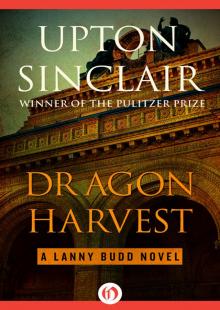 Dragon Harvest
Dragon Harvest The Jungle
The Jungle Sylvia's Marriage
Sylvia's Marriage Oil! A Novel by Upton Sinclair
Oil! A Novel by Upton Sinclair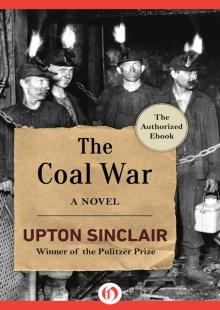 The Coal War: A Novel
The Coal War: A Novel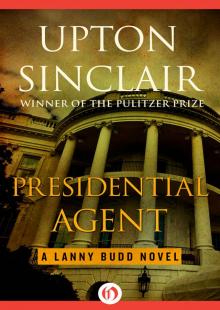 Presidential Agent
Presidential Agent World's End
World's End The Second-Story Man
The Second-Story Man O Shepherd, Speak!
O Shepherd, Speak!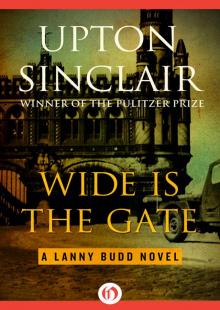 Wide Is the Gate
Wide Is the Gate The Return of Lanny Budd
The Return of Lanny Budd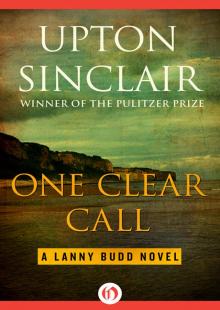 One Clear Call I
One Clear Call I 100%: the Story of a Patriot
100%: the Story of a Patriot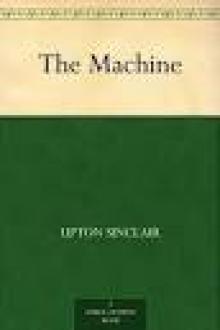 The Machine
The Machine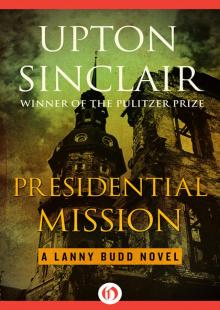 Presidential Mission
Presidential Mission A Cadet's Honor: Mark Mallory's Heroism
A Cadet's Honor: Mark Mallory's Heroism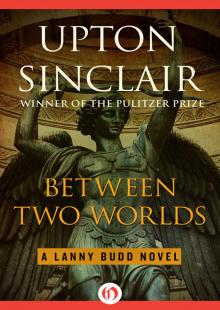 Between Two Worlds
Between Two Worlds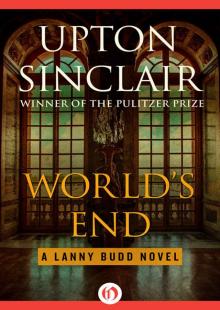 World's End (The Lanny Budd Novels)
World's End (The Lanny Budd Novels)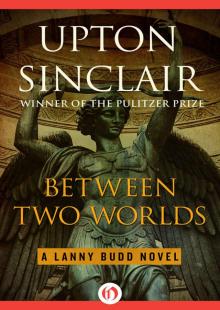 Between Two Worlds (The Lanny Budd Novels)
Between Two Worlds (The Lanny Budd Novels)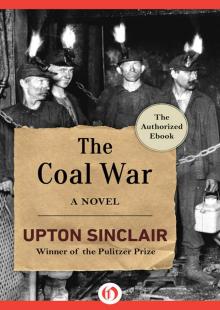 The Coal War
The Coal War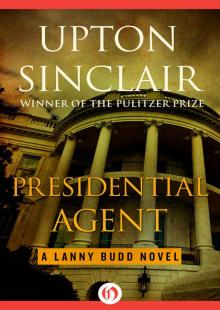 Presidential Agent (The Lanny Budd Novels)
Presidential Agent (The Lanny Budd Novels) Oil (filmed as There Will Be Blood)
Oil (filmed as There Will Be Blood)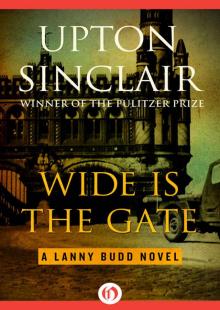 Wide Is the Gate (The Lanny Budd Novels)
Wide Is the Gate (The Lanny Budd Novels)